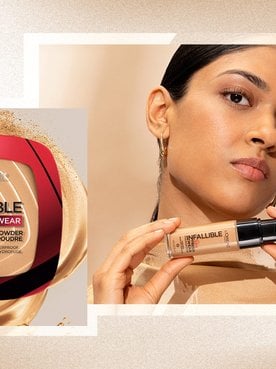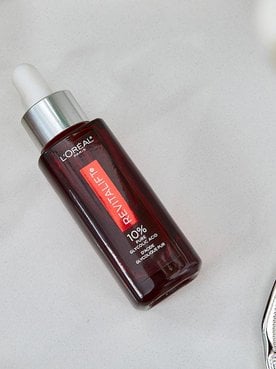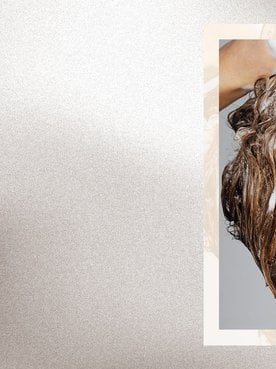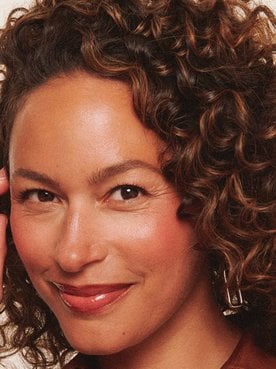Let’s all give a big thank you to color theory. If your brightening concealer seems to draw more attention to that angry red pimple or those persistent dark circles, you may want to consider adding a color corrector to your routine. Color-correcting makeup helps neutralize the appearance of discoloration, so your go-to concealer can cover it more effectively. The key to mastering the technique is finding the right color for your skin concern, but with shades like lavender, orange, and green, we know it can feel tricky to figure out where to start.
That’s why we’ve created this color corrector guide. Below, you’ll learn how to use corrector makeup for under-eye circles, redness, dullness, and more, plus get recommendations for the best L’Oréal Paris products to try for an even-toned coverage.
What is color correcting?
Color correcting is a makeup technique that uses tinted formulas to neutralize unwanted discolorations like redness, dark spots, and sallowness. These products usually come in cream, primer, or liquid concealer form, with bold shades ranging from green to lavender. Unlike traditional concealers, color-correcting concealers are not meant to match your skin tone, they’re designed to target and neutralize specific color concerns before you apply your foundation and your usual concealer.
Why it works comes down to the color wheel. Colors opposite each other on the wheel cancel each other out. By applying the right shade of color corrector, you can minimize discoloration, so your base makeup looks seamless.
What color corrector should you use?
Think of color correcting as makeup’s version of complementary color theory. In basic terms, warm tones neutralize cool tones and vice versa, so applying the opposite shade helps balance unwanted discoloration on the skin.
Here’s a quick guide with full explanations:
- Green color corrector is best for redness. This includes pimples, irritation, and rosacea. Green neutralizes red tones, helping to create a calmer, more even-looking complexion.
- Peach or orange color corrector works for dark circles and spots. Peach shades are best for light skin tones, while orange shades are more effective on medium to deep skin. These tones cancel out the bluish or gray hues common in under-eye circles and dark marks.
- Yellow color corrector helps with purple discoloration. It balances out bruises and violet-toned under-eye circles, giving the skin a more natural and even appearance.
- Purple or lavender color corrector brightens dull or sallow skin. Applying it to areas with yellow undertones restores radiance and gives skin a healthier, more luminous finish.
The secret to choosing the right color corrector is simple: match the shade of your skin concern to the opposite shade on the color wheel.
Green color corrector
Green color correctors are essential for neutralizing redness, from breakouts to rosacea. Since green cancels out red, it’s the go-to pick for calming inflamed or irritated-looking areas.
For all-over redness, a primer or BB cream may work better than spot correction. The L'Oréal Paris Magic Skin Beautifier BB Cream is a multitasker: it starts green, then transforms into a skin-tone finish that neutralizes redness, hydrates, evens tone, and perfects your complexion.

Peach and orange color corrector
Bluish under-eye circles and grayish dark spots call for peach or orange color correctors. Fair-to-light skin tones benefit most from peach tones, while medium-to-deep skin tones should reach for orange.
To brighten after correcting, layer on a lightweight concealer. The L’Oréal Paris True Match Radiant Serum Concealer is a great follow-up. This serum concealer hydrates while offering medium coverage. Use the doe-foot applicator to apply it in an upside-down triangle under the eyes, over your peach or orange color corrector, then blend well.

Yellow color corrector
If you’re dealing with purple discoloration, such as bruises or violet-toned under-eye circles, a yellow color corrector is your best bet. Yellow neutralizes purple tones and brings balance to uneven areas.
Lighter pastel yellows work best on fair skin, while deeper golden yellows suit medium-to-dark skin tones. Apply sparingly to discolored areas and blend before layering with foundation or concealer.
Purple color corrector
Dull or yellow undertones can make skin appear sallow. A purple (lavender) color corrector instantly brightens these areas, creating a fresh, luminous look. Apply lavender corrector on the chin, forehead, or under the eyes for added radiance.

To enhance the glow further, add the L’Oréal Paris True Match Lumi Glotion Natural Glow Enhancer. This lightweight product delivers a luminous finish that perfectly complements color correction.
Shop the Products
How to color correct in 4 easy steps
Now that you know which colors do what, let’s go through the steps to apply color correcting makeup properly. Always begin with clean, prepped skin before starting your makeup.
Step 1. Apply color corrector
The first step in any color corrector guide for the face is applying your chosen product before foundation. This could be a BB cream, a color-correcting primer, or a color-correcting concealer, depending on your needs. Using the right corrector makeup helps neutralize discolorations, smooth your base, and create the ideal canvas for foundation and concealer.
Here are our top product suggestions:
- L'Oréal Paris Age Perfect Makeup Blurring Face Primer Infused with Serum: This blurring primer has a rosy universal formula that instantly smooths lines and pores, boosts radiance, and keeps skin comfortable all day long. It is perfect for starting with an even base before color-correcting targeted areas.
- L'Oréal Paris Magic Skin Beautifier BB Cream: An ultra-light lotion that starts green to neutralize redness, then instantly transforms to your perfect shade. This BB cream delivers four beautifying actions in one: hydrates, primes, perfects, and corrects, giving skin a flawless bare-skin finish.
Shop the Products
Step 2. Layer on foundation
Once the corrector is blended, apply foundation to unify your complexion. Be mindful not to over-blend, or you risk moving the color corrector underneath.
Here are three of our favorite L'Oréal foundations:
- L'Oréal Paris True Match Super-Blendable Foundation: A liquid formula that adapts to your undertone, comes in 47 shades, and blends seamlessly for a natural, medium-coverage finish.
- L’Oréal Paris True Match Hyaluronic Tinted Serum: Combines hyaluronic acid with luminous pigments to plump and brighten skin while providing sheer, lightweight hydration.
- L’Oréal Paris Lumi Le Glow Skin Tint: Evens skin tone, boosts glow, and pairs beautifully with your color corrector to enhance an effortless, dewy, healthy-looking complexion.
Shop the Products
Step 3. Add concealer
Concealer is the step that enhances correction, providing extra coverage or brightness depending on your needs. While the color corrector neutralizes discoloration, the concealer either brightens specific areas like under the eyes or adds more coverage where you want it. This balance ensures that your color corrector looks natural and polished.
Here are some concealers you should try:
- L’Oréal Paris Infallible Full Wear Concealer Up To 24H Full Coverage: A highly pigmented, waterproof formula with a matte finish that provides long-lasting coverage and resists fading and creasing for up to 24 hours.
- L’Oréal Paris True Match Radiant Serum Concealer: A hydrating concealer enriched with a serum-like texture that brightens, smooths texture, and delivers medium coverage with a radiant finish that looks fresh all day.
- L’Oréal Paris Infallible Skin Ink 2-In-1 Foundation Concealer: This convenient hybrid combines foundation and concealer in one step. Its breathable formula delivers buildable medium-to-full coverage. If you want to skip a step, this product is for you. It’s ideal for streamlining your corrector makeup routine while leaving a natural, skin-like finish.
Shop the Products
Step 4. Set your makeup
The final step in your color corrector guide for the face is to set everything in place so your look lasts all day. Setting products help lock in your corrector makeup and base, whether you want a matte or natural finish.
Here are two options we recommend:
- L'Oréal Paris Infallible Blur-Fection Longwear Loose Setting Powder: A lightweight powder that extends wear, blurs imperfections, and maintains a matte finish. It’s especially effective after applying a color corrector for redness or dark circles, ensuring your correction stays put.
- L'Oréal Paris Infallible 3-Second Setting Mist: A quick-drying spray that sets makeup with a natural finish. Apply in “X” and “T” motions for even coverage, sealing in your color correcting routine for long-lasting, flawless wear.
Shop the Products
FAQs on color correcting
Do color correctors actually work?
Yes, color correctors work by neutralizing unwanted tones before applying concealer or foundation. When used correctly, they make it easier to achieve a more even and flawless finish. The key is to use thin layers and blend well before adding the rest of your base.
What goes first, color corrector or concealer?
Always apply color corrector before concealer. The corrector cancels out discoloration, while concealer adds coverage and brightness. Layering them in this order ensures that your makeup looks natural and effective.
Can you use a color corrector without foundation?
Yes, if you prefer a lighter routine, you can use color correcting concealer on its own to neutralize discoloration. Blend it well and set with a powder or spray for a natural finish. This works best for quick, no-makeup makeup looks.
Next Up: Where to Put Concealer to Brighten, Lift, and Perfect Your Look
Photo courtesy of L’Oréal Paris







